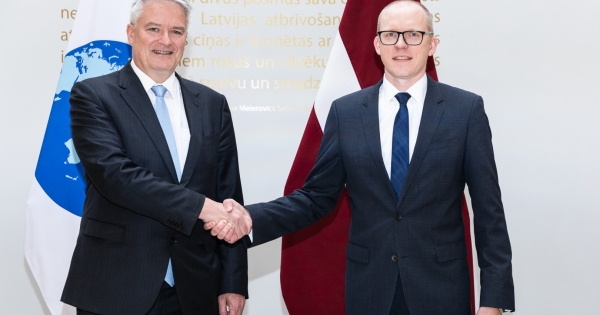
Meeting between State Secretary of the Ministry of Foreign Affairs and Secretary-General of the OECD

On 25 April 2024, the State Secretary of the Ministry of Foreign Affairs, Andris Pelšs, met with the Secretary-General of the Organisation for Economic Cooperation and Development (OECD), Mathias Cormann. During the meeting, the officials addressed bilateral cooperation, the external relations of the OECD, and support to Ukraine.
Importance of OECD Recommendations and Bilateral Cooperation
“OECD recommendations and bilateral cooperation projects with the organization are an important element in policy planning and its implementation in Latvia. They allow us to better evaluate and map out directions for the development of sectoral policies,” Andris Pelšs noted. He also underlined: “The organisation plays an important role in bringing together like-minded countries, who attach importance to values such as a sustainable and inclusive society, individual liberty and democracy. We welcome the OECD’s work towards strengthening those values. We thank the OECD for its support to Ukraine in the reform process”.
At the meeting, Andris Pelšs submitted a letter to the Secretary-General of the OECD expressing Latvia’s intention to join the OECD Development Assistance Committee, the leading international forum for development cooperation providers.
Secretary-General Mathias Cormann has arrived in Latvia on a working visit to present the latest economic review prepared by OECD experts that assesses Latvia’s economic situation. At the same time, the OECD provides recommendations for further economic reforms and investment promotion, which is the main research topic of the latest OECD Economic Survey.
The OECD Development Assistance Committee
The OECD Development Assistance Committee currently has 32 members: 31 countries and the European Union. The main lines of action of the committee are the collection and analysis of statistical data on development aid flows and the development cooperation systems of donor, experience sharing between member countries, as well as producing recommendations and guidelines on best practices for the donors.
SDGs, Targets, and Indicators Analysis
1. Which SDGs are addressed or connected to the issues highlighted in the article?
- SDG 17: Partnerships for the Goals
The article mentions bilateral cooperation and Latvia’s intention to join the OECD Development Assistance Committee, which aligns with SDG 17 that focuses on strengthening global partnerships for sustainable development.
2. What specific targets under those SDGs can be identified based on the article’s content?
- Target 17.1: Strengthen domestic resource mobilization, including through international support to developing countries, to improve domestic capacity for tax and other revenue collection.
- Target 17.9: Enhance international support for implementing effective and targeted capacity-building in developing countries to support national plans to implement all the Sustainable Development Goals.
The article mentions Latvia’s engagement with the OECD to improve policy planning and implementation, as well as support Ukraine in its reform process. These actions contribute to the targets of strengthening domestic resource mobilization and enhancing international support for capacity-building in developing countries.
3. Are there any indicators mentioned or implied in the article that can be used to measure progress towards the identified targets?
- Indicator 17.1.1: Total government revenue as a proportion of GDP.
- Indicator 17.9.1: Dollar value of financial and technical assistance (including through South-South cooperation) committed to developing countries.
The article does not explicitly mention these indicators, but the actions described, such as joining the OECD Development Assistance Committee and providing support to Ukraine, are indicative of efforts towards improving domestic resource mobilization and international capacity-building support.
SDGs, Targets, and Indicators Table
| SDGs | Targets | Indicators |
|---|---|---|
| SDG 17: Partnerships for the Goals | Target 17.1: Strengthen domestic resource mobilization, including through international support to developing countries, to improve domestic capacity for tax and other revenue collection. | Indicator 17.1.1: Total government revenue as a proportion of GDP. |
| SDG 17: Partnerships for the Goals | Target 17.9: Enhance international support for implementing effective and targeted capacity-building in developing countries to support national plans to implement all the Sustainable Development Goals. | Indicator 17.9.1: Dollar value of financial and technical assistance (including through South-South cooperation) committed to developing countries. |
Copyright: Dive into this article, curated with care by SDG Investors Inc. Our advanced AI technology searches through vast amounts of data to spotlight how we are all moving forward with the Sustainable Development Goals. While we own the rights to this content, we invite you to share it to help spread knowledge and spark action on the SDGs.
Fuente: mfa.gov.lv

Join us, as fellow seekers of change, on a transformative journey at https://sdgtalks.ai/welcome, where you can become a member and actively contribute to shaping a brighter future.



